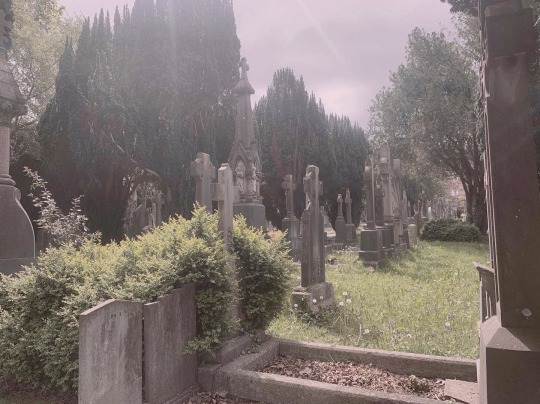#Glasnevin Cemetery
Text
#OTD in 1965 – Roger Casement’s body is re-interred in Glasnevin cemetery, Dublin.
‘Self-government is our right, a thing born in us at birth; a thing no more to be doled out to us or withheld from us by another people than the right to life itself.’
Roger Casement was born at Sandycove, Co Dublin in 1864. He joined the British colonial service and was knighted in 1911 for his work on behalf of African and South American native workers who were being exploited by whites.…
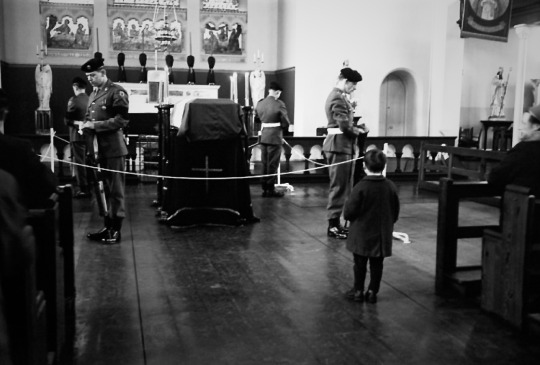
View On WordPress
#1916 Easter Rising#Co. Antrim#Dublin#England#Glasnevin Cemetery#History of Ireland#Ireland#Irish History#Murlough Bay#Northern Ireland#re-interred#Roger Casement
8 notes
·
View notes
Text
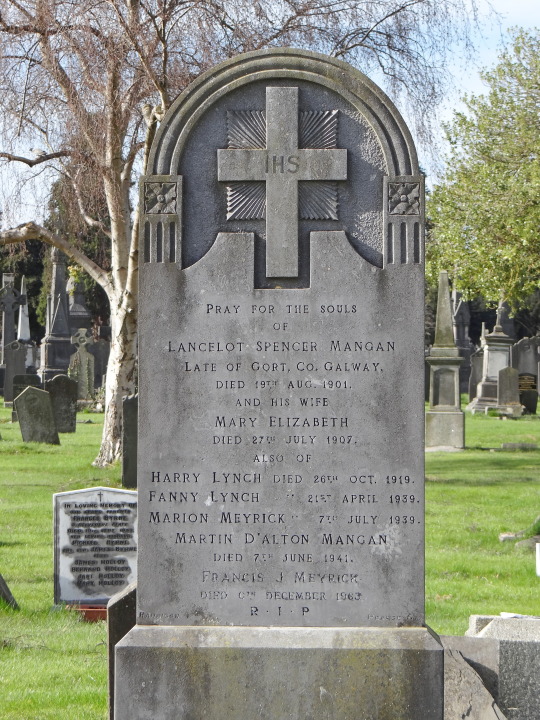
Tomb of Lancelot Spencer Mangan
Glasnevin Cemetery. Dublin, Ireland
March 2016
#cemetery#glasnevin cemetery#glasnevin#ireland#original photography#photography#taphophile#tomb#taphophilia#lensblr#photographers on tumblr#tombs#dublin#tombstone#wanderingjana
6 notes
·
View notes
Text
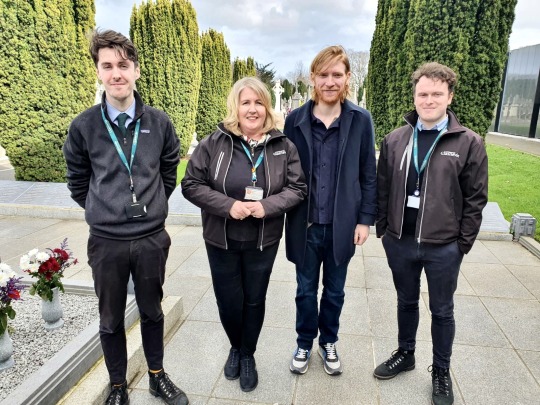
New Domhnall pic, taken at Glasnevin Cemetery in Dublin, during a guided tour.
Source Experience Glasnevin.
7 notes
·
View notes
Text
GOLDENBRIDGE CEMETERY GET OFF AT THE DRIMNAGH TRAM STOP RATHER THAN THE GOLDENBRIDGE STOP
Until 2017, the last burial was of W. T. Cosgrave in 1965, first President of the Executive Council of the Irish Free State. His grave, along with 26 others, were vandalised in 2014 but restored in 2016.
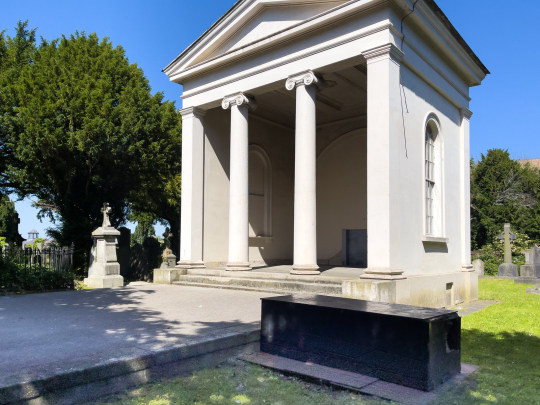
View On WordPress
#British Army#Cemetery#Dublin#Fotonique#garden cemetery#glasnevin cemetery#goldenbridge#grand canal#inchicore#Infomatique#Ireland#old graveyard#Richmond Barracks#roman catholic#W. T. Cosgrave#William Murphy
1 note
·
View note
Text

Established in 1833, John Kavanagh's got its nickname as the bar is built into the side of Glasnevin Cemetery and gravediggers would often stop in for a pint of "the black stuff" after a hard day's work.
As Ireland's National Cemetery, Glasnevin is the final resting place for many of the island's most famous sons and daughters, including Daniel O'Connell, Maude Gonne and Brendan Behan.
Thanks to @dublinsnugs for the lovely snap
8 notes
·
View notes
Note
hi guys! figured i'd drop in here last minute. i'm going to be visiting dublin in two weeks. do you have any recommendations for things to do or see? it seems like we have similar interests (or at least i share interests with your respective public personas) so i'd love your input. thank u <3
Maybe a little bit late - but here are some fun things:
- Glasnevin Cemetery. Pay your respects to our revolutionaries and freedom fighters (the big fellow, Michael Collins, is buried here, as is Daniel O’Connell)
- the National History Museum. Go on a pilgrimage to see the bog bodies. While you’re there, check out some 10,000 year old gold and ancient hazelnuts that I was personally desperate to eat
- take the DART along the coastline just for the fun of it. End up in Malahide (northside) or Killiney (southside); Malahide for snobby rich people shops and hill walks and a castle you can visit, Killiney for the best beach in Dublin. People will argue with me when I say this but they will be wrong.
- go to a trad night. Most pubs will have them some night of the week. There are excellent ones in town, the Library Bar’s is famous. Irish trad music is magic.
- the National Library has an excellent Yeats exhibition. Yeats: a real dickhead, but the bitch could turn a phrase. (By the way, the National Library and the National History Museum are within very easy walking distance of each other in Dublin City centre; as are the National Gallery and Trinity College, where you can visit the Long Library and the Book of Kells)
- if it’s sunny, grab a sandwich and go sit on the grass in Stephen’s Green with the rest of Dublin. Feed the ducks. Make a day of it.
- touristy things that are surprisingly fun: the Guinness Brewery, the aforementioned Book of Kells, Christchurch Cathedral (Strongbow’s bones are here)
- go on a 1916 tour of Dublin. Visit the shopfronts and monuments where physical evidence of the Easter Rising still exists. For one: the bullet hole in the breast of the winged virtue flanking Daniel O’Connell on what is now O’Connell Street. Is this fun for anyone else? I am obsessed with the Easter Rising and the way it shaped contemporary Ireland. At very least, read up on it if you aren’t familiar.
Let me know what you end up doing! And have a wonderful trip.
32 notes
·
View notes
Text
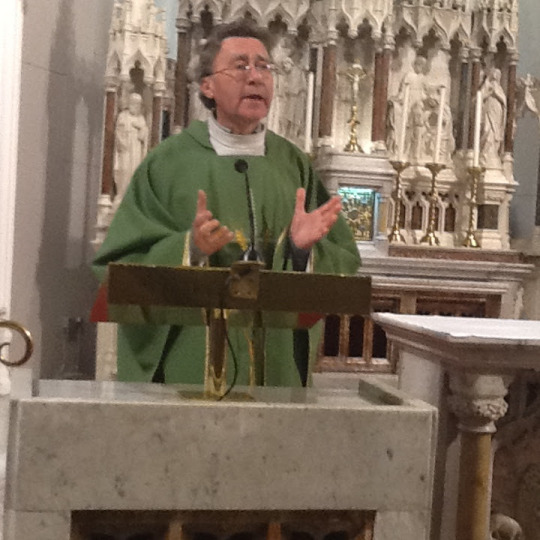
10th September >> Fr. Martin's Homilies / Reflections on Matthew 18:15-20 for the Twenty Third Sunday in Ordinary Time, Cycle A: ‘Where two or three meet in my name, I shall be there with them’.
Twenty Third Sunday in Ordinary Time, Cycle A
Gospel (Except USA)
Matthew 18:15-20
If your brother listens to you, you have won back your brother.
Jesus said to his disciples: ‘If your brother does something wrong, go and have it out with him alone, between your two selves. If he listens to you, you have won back your brother. If he does not listen, take one or two others along with you: the evidence of two or three witnesses is required to sustain any charge. But if he refuses to listen to these, report it to the community; and if he refuses to listen to the community, treat him like a pagan or a tax collector.
‘I tell you solemnly, whatever you bind on earth shall be considered bound in heaven; whatever you loose on earth shall be considered loosed in heaven.
‘I tell you solemnly once again, if two of you on earth agree to ask anything at all, it will be granted to you by my Father in heaven. For where two or three meet in my name, I shall be there with them.’
Gospel (USA)
Matthew 18:15–20
If your brother or sister listens to you, you have won them over.
Jesus said to his disciples: “If your brother sins against you, go and tell him his fault between you and him alone. If he listens to you, you have won over your brother. If he does not listen, take one or two others along with you, so that ‘every fact may be established on the testimony of two or three witnesses.’ If he refuses to listen to them, tell the church. If he refuses to listen even to the church, then treat him as you would a Gentile or a tax collector. Amen, I say to you, whatever you bind on earth shall be bound in heaven, and whatever you loose on earth shall be loosed in heaven. Again, amen, I say to you, if two of you agree on earth about anything for which they are to pray, it shall be granted to them by my heavenly Father. For where two or three are gathered together in my name, there am I in the midst of them.”
Reflections (5)
(i) Twenty Third Sunday in Ordinary Time
We have Glasnevin Cemetery very close to us here in the parish. The wall around the cemetery is broken by little towers. These were built as watchtowers to enable guards to watch for grave robbers when the cemetery was first laid out in the mid nineteen century. We have Martello Towers on our coastline also, not far from us here. These were built in the early nineteenth century as watchtowers because there was a fear that Napoleon could invade Ireland. The guards or sentries in the watchtowers would light a fire at the top of the tower if they spotted Napoleon’s ships. Watch towers have always been important in the past, before Satnav and all our other electronic devices today.
In today’s first reading, Ezekiel is appointed as a sentry, a watchman, to the House of Israel. He is being called to watch out for them and to warn them of danger. The danger isn’t coming from without but from within. Some of the people are living in ways that are undermining the stability of the community. Ezekiel has to warn them of the danger of their ways to themselves and to others. It is not an easy role to play. Most people don’t like being told that they need to change their ways, even if the person doing so has their well-being and that of others at heart. It would be a brave person who would tell Putin to change his ways at the moment! Yet, there is a sense in which God calls each of us to watch out for one another. Parents will certainly do that for their children. If they see a child doing something that could cause bodily injury to the child, parents wouldn’t hesitate to warn the child. As children grow into adolescence, parents may notice that their son or daughter is going down a path that would be damaging to them as human beings. Again they wouldn’t hesitate to try and get them to see this. It is far more challenging to confront an adult who is clearly taking a path that is damaging to themselves and to others. We would need to have a very good relationship with the person involved. Otherwise, we might be told to mind our own business.
In the gospel reading, Jesus foresees a situation in the church where an adult who has done wrong needs to be confronted by other members of the church. We have to imagine a small local community of believers, where the wrongful actions of one person has a negative impact on everyone else. In a tightly knit group, the wrongful behaviour of one person can drag everyone down. Jesus suggests that, initially, one person, the one most wronged, should talk to the person who has done the wrong in private, keeping the issue just to the two people. In other words, try to deal with the issue in a way that allows the person who has done wrong to save face. Great sensitivity is required. Only if that fails should other people be brought in. Jesus is suggesting that sometimes loving a person means helping them to see that their behaviour is damaging to themselves and to others. However, it has to be done in a spirit of love, all the time recognizing that, in the words of Jesus elsewhere in the gospel, the person trying to show the way probably has a plank in their own eye. We always approach someone aware of our own need for God’s mercy and for other people’s forgiveness.
Jesus seems to be saying to us in the gospel reading that we are responsible for one another’s wellbeing, not just their physical wellbeing, but their moral and spiritual wellbeing also. We are called to bring each other to the Lord, to help one another take the path that the Lord is calling us to take, because we journey together towards him. In the words of today’s Psalm, we belong to the Lord’s flock that is led by his hand. We journey together as pilgrims towards the Lord, aware that we are all sinners and yet unconditionally loved by God. On this communal pilgrimage, we are called to help one another towards goodness, to support one another on our way to God. This is part of what Saint Paul calls in the second reading the debt we owe each other, the debt of mutual love. One of the ways we express our love for one another is by showing each other the best way forward. Sometimes this will mean correcting each other and allowing ourselves to be corrected by others. However, that has to come from a place of love, because as Paul says in that reading, ‘Love is the one thing that cannot hurt your neighbour’. It also has to come from a place of prayer. We need to be people of prayer if we are to truly watch out for one another on our shared journey as the Lord’s disciples. In the gospel reading, Jesus assures us that when we pray, especially when we join with others in prayer, he will be in our midst. ‘Where two or three meet in my name, I shall be there with them’. Our openness to the Lord’s presence in prayer will empower us to support each other on our earthly pilgrimage towards the heavenly Jerusalem.
And/Or
(ii) Twenty Third Sunday of the Year
I am sure that most of us could name people who influenced us for the better in the course of our lives. Many of us, in this regard, will think of our parents, or, perhaps, some teacher or a good friend or a football coach. These are people who helped to bring the best out in us. They took an interest in us; they encouraged us when we needed encouragement, and they might have challenged us as well when we were loosing the run of ourselves. Their challenging word was probably more difficult to hear that their encouraging word, but deep down we knew that both sets of words were coming from the same source, from a heart that cared and was interested. Such people felt a certain sense of responsibility for us.
I am sure you are familiar with the story of Cain and Abel in the book of Genesis. After Cain killed Abel, the Lord said to Cain: ‘Where is your brother?’ and Cain replied, ‘I do not know; am I my brother’s keeper?’ That question of Cain has echoed down through the ages, ‘Am I my brother’s or sister’s keeper?’ ‘Am I responsible for others?’ The message of the gospel is very clear that, in a very fundamental way, we are responsible for each other. We need, in a sense, to be looking out for each other. That strong gospel value is evident in the gospel reading today. A clear procedure is offered there for dealing with a member of the church, a fellow traveller in faith, who has gone off the rails, as it were. In other words, it is taken for granted that if someone is clearly doing wrong, and, to that extent, is on a self-destructive course, it is the responsibility of everyone in the community to somehow bring that person to their senses. The particular procedure for doing that, which the gospel reading suggests, is not necessarily one that we might be inclined to adopt today. However, what remains valid for us today is that, as fellow pilgrims, we are, to some extent, responsible for each other, and we do need to be looking out for each other. To put that another way, none of us journeys to God alone. We travel that journey together, and we are dependant on each other to travel it well. As believers, we need the encouragement and the challenge that only other believers can provide.
It is sobering to realize that we are called to bring each other to the Lord. There are many examples in the gospels of individuals who lived that calling very fully. The Samaritan woman comes to mind. Having met the Lord for herself, she left the well and went back to her town and proceeded to bring other Samaritans to the well, to the Lord. What she did so well is what we are all called to do. The Lord worked through her to nurture faith in others. The Lord works through each of us to touch the lives of others, to draw others to him. In a sense, the Lord has made himself dependant on us.
Yet, we are aware that as well as leading each other to the Lord, we can also block each other from making deeper contact with the Lord. You remember last Sunday’s gospel reading where Jesus addressed Peter as a stumbling stone. Peter, by his attitude, was effectively blocking Jesus from taking the path that God was calling him to take. When we look at Peter, all we can say is ‘there but for the grace of God go I’. Any one of us can become a stumbling stone for another, or for several others. We can bring each other to the Lord or lead each other away from him. That is the awesome influence and responsibility that we have. In the gospels, Jesus is quite severe on those who prove a stumbling stone to others: ‘If any of you put a stumbling stone before one of these little ones who believe in me, it would be better for you if a great millstone were fastened around your neck and you were drowned in the depth of the sea’.
We need to be mindful of the influence that we have on each other’s relationship with the Lord – an influence that can be for good or for bad. In the first reading, the prophet Ezekiel was appointed as a sentry to the House of Israel. A sentry stood on the walls of the city, ready to warn the citizens of any approaching danger. It was a responsible job, because the welfare of others was dependant on his doing it well. There is a sense in which we are all called to be sentries, people who look out for each other’s well being – and not just each other’s physical well being, but each other’s moral and spiritual well being as well. The first step in attending to each other’s well being, in this broad sense, is by each of us attending to our own well being. When I respond generously to the Lord’s call in my own life, I am building up the faith all those around me. When I turn away from the Lord’s call in my own life, I am undermining their faith. When I fail to live the values of the gospel, I am making it more difficult for others to do so. When I strive to live the values of the gospel, I am helping others to do the same, even if my living of the gospel appears to be bearing little fruit in others. Sometimes it is not given to us to see the fruit of our own efforts. Yet, we can be confident that to the extent that we allow Christ to live in us, we will also be creating a space for him to live in others.
And/Or
(iii) Thirty Third Sunday in Ordinary Time
You may have noticed some weeks ago that cannons were fired from a restored Martello Tower in Kiliney as a French frigate sailed out of Dublin Port. There are a large number of Martello Towers around our coast, built at the beginning of the nineteenth century to provide look out stations and an early warning system in the event of an invasion by Napoleon’s navy. The invasion never came, but we were left with these very fine watch towers which have continued to grace our coastline. In today’s first reading we find the image of the prophet as a watchman or a sentry. Ezekiel’s role is likened to that of the watchman on the walls of the city who looks towards the horizon for an approaching enemy and warns the people of the city of immanent danger. In a similar way, one of the roles of the prophet was to warn the people about the dangers of certain kinds of behaviour, behaviour that was not appropriate for members of God’s covenant people. In such situations, it is the responsibility of the prophet to warn; it is the responsibility of those who listen to respond. The prophet was called to look out for people, to keep watch on their behalf and to warn them when appropriate.
In the gospel reading this morning, a situation is envisaged in which members of the church look out for each other and correct each other when that is called for. We probably have to image a situation in which someone’s behaviour is seriously damaging to the whole community and if the person is allowed to continue behaving as he has been the whole community will be seriously undermined. A disciplinary procedure is put in place for such a scenario. Initially one person has a private conversation with the offending member of the community; if that does not work, several people engage with him; if that does not work the whole community confronts him, and if that does not work the person is expelled from the community until he comes to his senses. There is a procedure there which was appropriate to the early years of the church and we would not follow it today. Yet, the value which underlies the procedure retains its validity today.
The gospel calls on us to look out for each other. Before the Lord we are not just responsible for the quality of our own lives but we are also responsible, to some extent, for the quality of other people’s lives as well. We have to watch out for each other. Parents do that all the time for their children. They stand guard over them and warn them when their children are putting themselves in unnecessary danger. Sometimes heart to heart talks can be called for. Such encounters can be challenging. They are even more difficult and more sensitive when two adults are involved who are not related by blood. None of us likes to be corrected; we instinctively feel that the person correcting us should mind their own business, and most of us dislike having to confront someone about their behaviour, even when it is impacting very negatively on us. Our instinct is to let things go, even when the consequences of that is the building up of resentment in ourselves. We can end up communicating our annoyance, our resentment even, indirectly rather than directly, but the issue never really gets resolved. It just continues to fester in us. In that sense, whereas saying something to the person can be a risk, saying nothing can be a bigger risk.
There is some wisdom in the call of the gospel reading this morning to look out for each other, and, where necessary, correct each other. It is not the case that the gospel reading is calling on us to get up into the equivalent of our Martello towers and start pointing the finger at all around us. Today’s gospel reading has to be balanced against other passages from the gospel, such as the one where Jesus warns against seeing the speck in the neighbour’s eye and not noticing the log in our own. When we try to watch out for others we do so in the awareness that we are far from perfect ourselves. Today’s second reading from Saint Paul gives us the appropriate lens through which to interpret the message of the first reading and the gospel reading. Paul says there, ‘love is the one thing that cannot hurt your neighbour’. Our watching out for each other has to be an expression of our love for each other. If it is not an expression of love, then we are just interfering busybodies. It is because we care about each other’s well being that we are prepared at times to take the risk of addressing an issue that is calling out to be addressed.
Jesus was the fullest expression of God’s love. He was God’s love in human form. He had a special regard for Peter whom he chose as the leader of the twelve apostles. Yet, when Peter stepped out of line, Jesus confronted him very strongly. None of us can take on the role of Jesus in that regard, because we fall so far short of his goodness and love. Yet, he shows us that authentic love rejoices in the truth, even when facing the truth is painful for all.
And/Or
(iv) Twenty Third Sunday in Ordinary Time
This is the first Sunday of September and the school and college year is just beginning. Children in our local parish primary schools have just returned. Some of those children will be making their first communion and their confirmation next May. The parish based programmes relating to those two sacraments will soon begin. This coming Tuesday in the school hall, there will be a meeting of the parents of first communion children to introduce them to the ‘Do this in Memory’ programme which brings together the parish, the school and the home in helping to prepare the children for their first holy communion. Every year a group of parents emerge from that meeting to direct this programme and in particular to help prepare the special monthly Sunday Mass in the parish for the children who are to make their first communion. The programme brings together the parish, the family and the school in the preparation of the children to receive the Lord in the Eucharist.
I think the programme expresses very well how we are called to live as church, as members of a believing community. We are called to journey with each other in a way that helps each other to grow in our relationship with the Lord, to grow in our faith. As a church, we have a special responsibility for our children and our young people but we are all responsible for one another when it comes to our journey in faith. That is one of the messages that comes through from today’s readings. In that first reading we have the image of the prophet Ezekiel as a sentry for the house of Israel. Like the watchman on the wall of the ancient city, he is to warn the people of danger, not so much military danger but moral danger. If he sees someone heading in a direction that is contrary to the Lord’s will for their lives, he is to warn that person on behalf of the Lord. The spiritual and moral well-being of the community was very much Ezekiel’s business. In the gospel reading, Jesus suggests that the spiritual and moral well being of others is the business of everybody in the community. If a person in the community has done a serious wrong to someone else in the community, the person who has been wronged is to take the initiative to seek out the person responsible so as to address the issue. However, if that does not work, others will need to be brought in and, perhaps, even the larger community. It is not about ganging up on someone but helping them to take a path that is more in keeping with the Lord’s call and desire for their lives. The gospel suggests that we have some responsibility for each other’s spiritual and moral well-being.
Nowadays we tend to take the line that we should keep our noses out of other people’s business. However, in today’s gospel reading Jesus insists that it is not enough for his followers just to mind their own business. We are each responsible in some way for the spiritual well being of the whole community. In the example Jesus gives the whole community suffers from the wrongful behaviour of one of its members. An opposite example could have been given whereby the whole community benefits and is built up because of the generous and self-giving behaviour of one of its members. The goodness and failings of any one of us can affect the whole community, the entire family of faith. Whether we are aware of it or not, we have an influence for good or for harm on other members of the faith community. To that extent, it is not a case of deciding whether or not to take responsibility for one another’s spiritual and moral well being. We are already responsible for each other because we are so interdependent. Saint Paul was very aware of the ways we can build each other up or bring each other down. He understood the church as the body of Christ. If one part of the body is not well, the whole body is affected. If one member of the body is fully open to the gift of the Spirit, everyone in the church is the better for it. At the beginning of this morning’s second reading Saint Paul says, ‘avoid getting into debt, except the debt of mutual love’. One of the ways we express this mutual love is by helping to build each other up spiritually and morally.
We have each received a calling in the church that is unique to each of us and if we are trying our best to respond to that calling everyone in the believing community, especially in our local church, will benefit from it. The Holy Spirit has gifted each of us in a particular way and if we can learn to live fully out of that gift we have received, the whole believing community is built up. The individual does make a difference. Insofar as any one of us is trying to answer the Lord’s very personal call, we make it easier for everyone else in the believing community to do the same.
And/Or
(v) Twenty Third Sunday in Ordinary Time
My father hated getting into debt. He bought something once on what was then called hired purchase and he was a wreck until he finally paid off what was owed. If he didn’t have the money for something, he wouldn’t buy it. That attitude was quite typical of his generation. However, very few people follow that path today. Most people are carrying some level of debt, otherwise, they wouldn’t have a home to call their own. What people aim for today is to have a level of debt that is sustainable in relation to income. Paul’s exhortation at the beginning of today’s second reading could not be taken literally by most people, ‘Avoid getting into debt except the debt of mutual love’. Yet, when Paul goes on to spell out what he means, we can acknowledge the truth of what he is saying. He declares that those commandments among the ten commandments that deal with how we relate to others can all be summed up in one commandment, ‘Love your neighbour as yourself’. He says that because ‘love’ is the one thing that cannot hurt our neighbour, it is the answer to every one of the commandments.
It is likely that Paul is here quoting the tradition that came from Jesus, some fifteen years or so before it was written down, before the earliest gospel, Mark’s gospel, was written. According to Mark’s gospel when a scribe asked Jesus ‘Which commandment is the first of all?’, Jesus answered, ‘the first is, “Hear, O Israel: the Lord our God, the Lord is one; you shall love the Lord your God with all your heart, and with all your soul and with all your mind, and with all your strength’. Jesus was saying that we owe a debt of love to God which is owed to no one else. However, Jesus immediately continues by giving the scribe an answer to a question the scribe hadn’t asked, ‘What is the second commandment?’ Jesus says the second is this, ‘You shall love your neighbour as yourself’. It is what Jesus calls the second commandment that Paul reflects upon in today’s second reading.
I find Paul’s statement there quite striking, ‘love is the one thing that cannot hurt your neighbour’. He is saying that if we were fully loving, we would never do or say anything that would hurt others. The reality is that none of us are fully loving. The only fully loving human being was Jesus. He alone was God’s love in human form. When in his first letter to the Corinthians, Paul portrays ‘love’, he is really giving us a portrait of Jesus, ‘Love is patient; love is kind; love is not envious or boastful or arrogant or rude; it does not insist on its own way; it is not irritable or resentful; it does not rejoice in wrongdoing, but rejoices in the truth… Love never ends’. This is the quality of love Jesus displayed throughout his life and, above all, in his death’. ‘No one has greater love than this’, he said, ‘to lay one’s life for one’s friends’. In that context, Jesus also says, ‘Love one another as I have loved you’. Yet, while he does put this wonderful ideal before us, to love one another as he has loved us, he was also aware that we would often fail to love in this full and complete way. We would hurt one another, offend one another, and become estranged from one another. Relationships go wrong, and, sometimes, turn very sour. Conflict and disagreements are inevitable, especially among those who are close to each other. We can all let slip the dogs of war. In today’s gospel reading, Jesus acknowledges this reality. He proposes to his rather close-knit family of disciples a procedure for dealing with the inevitable conflicts that will arise among them because of their failure to love. The person who has done the wrong needs to be spoken to in love. Jesus’ suggested way of proceeding may not suit every situation of conflict today. Yet, his basic message is valid for all time, ‘When there is conflict among you, because someone has clearly done something very unloving, find a helpful way of dealing with the conflict’. In other words, ‘don’t not deal with it’.
Jesus implies in that gospel reading that we have a responsibility for each other’s well-being, not just each other’s physical well-being but each other’s moral well-being. We are to help each other towards goodness. We have a role to play in helping one another to be more loving. It is not that some of us are the moral superiors of others. We are all sinners and we each need others to help us on our way towards God. Being human, being Christ-like, being loving, is a complicated business and we all make mistakes in the process of learning to do it right and we need to stand together in that process. When we stand together in this vital work of helping each other become all that God wants us to be, Jesus promises us in today’s gospel reading that he will be with us. ‘Where two or three meet in my name, I shall be there with them’.
Fr. Martin Hogan.
8 notes
·
View notes
Text
Shoutout to the two people on r/IrishHistory who think Kitty Kiernan was a "lasher" because she DARED to get into two relationships in her life and go on a few dates with one guy.
In 1918, Harry and Michael traveled to Longford where Kitty and her siblings worked at taking care of the family business in Granard and stayed at the Greville Arms. At this time, Harry was the one dating Kitty and Michael’s interests were directed at Kitty’s sister, Helen. But Helen had another male friend seeking her affections and they eventually married, much to Michael’s dismay.
According to Sean MacEoin, Michael was originally attracted to Helen Kiernan ‘who oozed charm,’ but she was already engaged to a local lawyer, Paul McGovern. Frank O’Connor claimed that ‘on the night before her wedding [Michael] went to her hotel and pleaded with her not to go through with her marriage’ and that during the wedding speeches he was so agitated that he shredded his handkerchief. He then transferred his affections to a second sister, Kitty, with whom Harry Boland was also in love. Kitty had a very pleasing personality: clever, capable, articulate, well groomed, poised, always impeccably dressed, pretty rather than beautiful. (James MacKay).
The friendship Boland and Collins shared grew as they spent an increased amount of time together and this must have played a role in Collins’ hesitation to go after Kitty immediately. By 1919, Boland was surely in love with her. Michael enjoyed escaping to the country to play tennis, talk, and dance. In the summer of 1920, Harry returned to Ireland from America to take a break. He and Kitty spent time together and when it was time for Harry to leave again, Michael walked Kitty to tell Harry goodbye at his own risk.
In 1921, Michael traveled to Granard alone and stayed with Kitty. He invited her to a horse show and they met a number of friends there, Harry included. During the latter part of the year, it was apparent that Harry and Michael were competing for Kitty’s love. Both wrote to her frequently while they were out of the country, Harry being in New York and Collins in London. The correspondence between Michael and Kitty has been recorded in the book In Great Haste, a phrase that usually appeared in the letters. Over time, Kitty chose Michael but it is not clear how she went about breaking off her relationship with Harry.
Source:
Her and Micahel dated for about 2 years I believe before getting engaged but unfortuanetly were never able to marry as Michael was killed mere months before their wedding was scheduled to happen. A few years later, however, Kitty Kiernan finally did get married but the ghost of Collins never left her, and she remained more than slightly obsessed with her dead fiance. She and her husband had two sons and their youngest was named Michael Collins Cronin, after her first love. When she died on this day in 1945, she was buried in Glasnevin Cemetery and her husband buried her as close to Michael Collins as possible, as per her last request.
Tell me, at what point does Kitty sound like a "lasher"? Both Michael and Harry were persuing her and while, yes, Kitty was dating Harry (dating back then just meant that they were going on dates, by the way, Kitty and Harry were never actually in a relationship as far as I know) but she also had every right to be with Michael, the man she was actually interested in and had feelings for, rather than staying with Harry, who she just didn't have feelings for.
Michael was literally going after HER SISTER WHILE SHE WAS ENGAGED TO ANOTHER MAN and even BEGGED HER NOT TO GO THROUGH WITH THE MARRIAGE ON THE NIGHT BEFORE THE WEDDING and when she did go through with the wedding, MICHAEL WENT AFTER HER SISTER INSTEAD! But somehow, KITTY is a lasher!? Why does Michael get zero criticism for going after an engaged women and the second she was married going after her sister but yet the sister gets labeled as a "lasher" for changing her mind?
Kitty was being pursued by Harry and Michael and chose Michael. That does not make her a lasher. Harry and Michael both were killed and Kitty grieved for them. That does make her a lasher. Kitty never fully got over Michael and continued to grieve him her whole life. That does not make her a lasher. Kitty wanted to get married and have children and be loved. That does not make her a lasher. Kitty married years after Michael died. That does not make her a lasher.


This interaction btw is the one that inspired my post. The first link that was shared is, in my opinion, is more of an opinion piece than an actually fact based article on Michael and Kitty. The article comes of more as something you would post here on tumblr about a ship you like rather than an actual article teaching you about historical figures.
The second article actually is fact based and is about Kitty's son, Michael (I'll let you guess who he's named after). The article mentions that Kitty and Felix were not happily married and the article alludes to the fact that this was partly because Kitty never really got over Michael and was not happy as a stay at home mam with no job (both are very understandable reasons in my opinion). I don't see how you can read this article and call Kitty a "lasher" because she absolutely isn't. She loved Michael and never got over him but still wanted marriage and kids which is very understandable when you realise she lost both parents and 2 siblings when she was a literal teenager! Of course, a woman who grew up in traditional and Catholic Ireland that lost both of her parents, a twin sister, another sister, lived during world war 1, lived during the Irish War of Independence, lost a friend who she went on a few dates with and then lost her fiancé would want to get married and have kids! It makes perfect sense for her to want the security of marriage and children to love and take after. Of course, she would want a family because she had already lost so much of her own. None of this makes her a lasher. It makes her human.
#History#European history#Irish history#World history#Ireland#Irish War of Independence#Michael Collins#Kitty Kiernan#Harry Boland
6 notes
·
View notes
Text
Good Things In 2022
“It’s that time of year again! Time to remember all the good things that happened in 2022. I’ve done this since 2017, and highly recommend doing this as a fun way to reflect (and to have something for future reference when you are feeling Down.)
feels like I literally just did this for 2021, and yet.
just under the wire...
PERSONAL
I MOVED ACROSS THE WORLD!!!!! I am now living in Dublin, Ireland. it was a move I'd been aiming to do for years, and once I received my citizenship and Irish passport, I decided to give it a shot. I've been here for nine months and am having a wonderful time.
I did more traveling this year than I think I ever have in a single calendar year.
In Ireland, I've visited several counties and lots of Dublin, including: Malahide, Howth, Dún Laoghaire, Dublin Mountains, Glasnevin Cemetery, Little Museum of Dublin, GPO Museum, National Gallery of Ireland, National Museum(s) of Ireland, EPIC Museum.
I finally went to Paris for a few days in June! Visited: Musée d'Orsay, Eiffel Tower, Sacré-Coeur, Notre Dame (closed to visitors due to renovation/restoration work but wandered around the outside and had a fabulous lunch). Bonus points for the Paris Métro, which fuckin rules.
I finally went to Italy for a long weekend in October! Got to see my folks that weekend as well. Spent time in Venice and Florence. Ate a lot of good food and gelato.
My beloved Seattle Mariners broke a 21 year drought and made it to the PLAYOFFS!!!!!!
I have been puttering away on a ROGUE ONE-FRINGE fusion/AU, ENDLESS FORMS MOST BEAUTIFUL. it has been super slow going but I am trying and I WILL finish it.
Similarly, sorta, I took a writing class! I shared a snippet of my original writing which was well-received. I got some lovely comments from my teacher which is currently sustaining me.
Anything bolded below is something I particularly enjoyed and recommend.
MOVIES
2022 movies I saw and liked:
TURNING RED
THE BATMAN
THE NORTHMAN
EVERYTHING EVERYWHERE ALL AT ONCE
TOP GUN: MAVERICK
3000 YEARS OF LONGING
NOPE
SEE HOW THEY RUN
TICKET TO PARADISE
THE WOMAN KING
ENOLA HOLMES 2
BLACK PANTHER: WAKANDA FOREVER
GLASS ONION
BONES AND ALL
THE MENU
AMBULANCE
THE UNBEARABLE WEIGHT OF MASSIVE TALENT
2021 movies I saw for the first time and liked:
ETERNALS
THE TRAGEDY OF MACBETH
FREE GUY
SPENCER
THE MATRIX RESURRECTIONS
UNCHARTED
TV
EUPHORIA (saw season 1, did not watch season 2. lol.)
MOON KNIGHT
FRINGE
STRANGER THINGS, SEASON 4
MS MARVEL
THE SANDMAN
THE CROWN (the first few seasons and then I stopped : / )
1899
DARK (BRO........ BRO........ BEST TV SHOW OF THIS CENTURY?????)
Special acknowledgment: ANDOR. what a trip and a half to see my beloved son on screen once more. I shared some thoughts here.
BOOKS
Did not read nearly as many as I should have! (I did read some other books but they are not on this last as I did not like them).
"Strangers to Ourselves" by Rachel Aviv
"Greywaren" by Maggie Stiefvater
"Babel" by RF Kuang
"She Who Became The Sun" by Shelley Parker-Chan
"Wild Game: My Mother, Her Lover, and Me" by Adrienne Brodeur
"The Hours" by Michael Cunningham
"The Seven Husbands of Evelyn Hugo" by Taylor Jenkins Reid
"The Burning God" by RF Kuang (incredible series but BOY will it fuck you up!!!!!!)
"The Dragon Republic" by RF Kuang
"The Poppy War" by RF Kuang
"Winter Recipes From the Collective" by Louise Gluck
"You Feel It Just Below the Ribs" by Jeffrey Cranor
"Oscar Wilde: A Life" by Matthew Sturgis
OTHER GOOD THINGS
*some of these things are Good as in well-written or well-made, but maybe not Good in topic.
Saw a couple plays at the Abbey Theatre: "Translations" by Brian Friel and "Joyce's Women" by Edna O'Brien. Quite different, both devastating.
Morocco's run at the FIFA Men's World Cup.
Joplin Sibtain, who played Brasso on ANDOR, shared a reel on Instagram of the SPOILERS riot scene on Ferrix with "Killing in the Name" dubbed over it. Incredible.
Martin Scorsese watches DERRY GIRLS.
Local Man Sees Cheese For Sale At Incredibly Low Price, Makes Executive Decision, Purchases 40 Pounds of Cheese
Is Twitter dying? Probably. Here's a thread where everyone shared their favorite tweets.
This angry little dog.
Mother losing it over her baby's laughter.
Dave Sims' calling Cal Raleigh's home run that sent the Mariners to the playoffs for the first time in 21 years.
Janan Ganesh over at the Financial Times with an incredible and scathing assessment of why Liz Truss and the Tories have never gotten Brexit "right". (Hint: they think the UK is on par with the US.)
Twitter user attempts to summarize RIVERDALE in a thread.
This TikTok of two preteen girls discovering landlines that made me LOL and also made me feel DECREPIT.
Shauna Bowers for The Irish Times with a dispatch from Electric Picnic that featured bangers of lines, including: The most sacred Electric Picnic institution of all remains untouched: the inflatable chapel, where all true love stories begin. “That’s probably the only way I’d be able to get you to marry me,” a woman says to her boyfriend. He says nothing.
Ichiro Girl returns to T-Mobile Park and throws out the first pitch to, of course, ICHIRO.
A story about how dogs are the best.
Pianist named Alex Pian covers "Time" by Hans Zimmer in Lviv, Ukraine, as air raid sirens sound. Really powerful.
Emma Baccellieri for Sports Illustrated explores a topic we've all wanted to know more about: what baseball relief pitchers are thinking when they run in from the bullpen during a bench clearing.
This video of STAR WARS characters singing a classic.... just watch it.
MORE
CONTACT is one of my favorite movies and Rachel Handler for Vulture wrote an oral history for the film's 25th anniversary.
Stephania Taladrid for The New Yorker, on the ground at an abortion clinic in Houston when Roe was overturned. Required reading.
Linda Villarosa for The New York Times, "The Long Shadow of Eugenics in America". also required reading.
Joshua Rothman for The New Yorker, "Anatomy of Error". A neurosurgeon reckons with surgeries that go wrong. Fascinating!
Rachel Pearson for The New Yorker, "Waiting at a Texas Hospital for the Children Who Never Arrive". Dispatches from a trauma center in the aftermath of the Uvalde shooting. Required reading.
Similarly, Albert Burneko for The Defector, "What It's Like Here". On being a parent in America.
Palate cleanser: Cincinnati Reds allow no hits against Pittsburgh Pirates... and still lose. lol.
Evgenia Peretz for Vanity Fair with an absolutely wild ride of a read about a Grey's Anatomy writer who.... made up an entire life.
Rachel Aviv (who never misses, incidentally) for The New Yorker, "How an Ivy League School Turned Against a Student". What makes a "good" victim?
this thread about creepy shit kids say???
PIZZA FOR DOGS.
sending you all warmth and affection and hoping you have a safe, healthy, and wonderful 2023.
tagging anyone who wants to do this (and tag me so I see it!) as well as those who've done this in the past: @vaderkat @fortysevenswrites @leaiorganas @magalis @illuminahsti @i-am-slain @antifandor @alittlemomentum @cassianserso @callioope
11 notes
·
View notes
Text
#OTD in 1868 – Birth of Irish patriot and revolutionary, Countess Constance Markievicz, née Gore-Booth in London.
Countess Markievicz, born Constance Georgine Gore Booth, politician, revolutionary, tireless worker with the poor and dispossessed, was a remarkable woman. Born into great wealth and privilege, she lived at Lissadell House in Co Sligo. She is most famous for her leadership role in the 1916 Easter Rising and the subsequent revolutionary struggle for freedom in Ireland.
Born in 1868, Constance was…
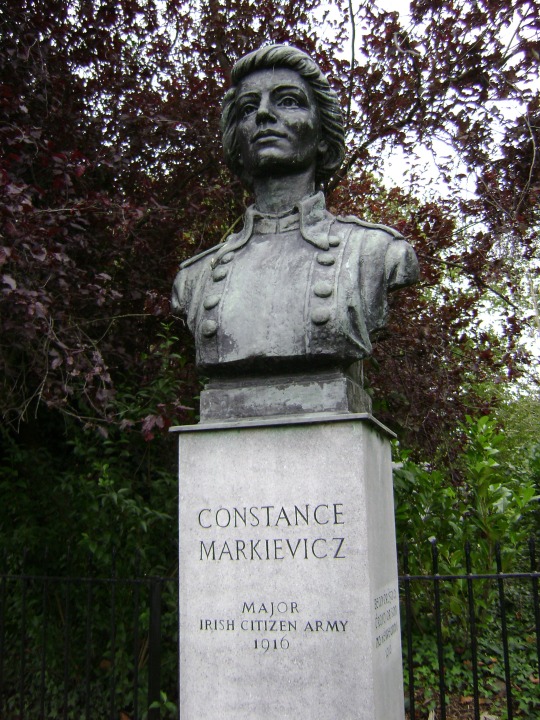
View On WordPress
#1916 Easter Rising#Ailsbury Gaol#Anglo-Irish Treaty#anti-Treaty#Casimir#Casimir Dunin-Markievicz#Co. Sligo#Constance Markievicz#Countess#Dáil Eireann#Dublin#Dublin Lock Out#England#Fianna Fáil#Glasnevin Cemetery#Irish Citizen Army#ITGWU#James Connolly#Kilmainham Gaol#Liberty Hall#Lissadell#Maeve Allys#Michael Collins#née Gore-Booth#Sir Josslyn Gore Booth#Ukraine#W.B. Yeats#Westminster Parliament
9 notes
·
View notes
Text
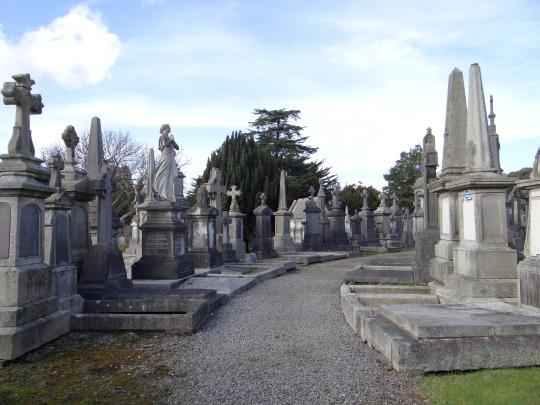
Glasnevin Cemetery, Dublin
#dublin#glasnevin#tomb#cemetery#original photography#taphophile#photography#taphophilia#lensblr#photographers on tumblr#tombs#ireland#wanderingjana
4 notes
·
View notes
Text
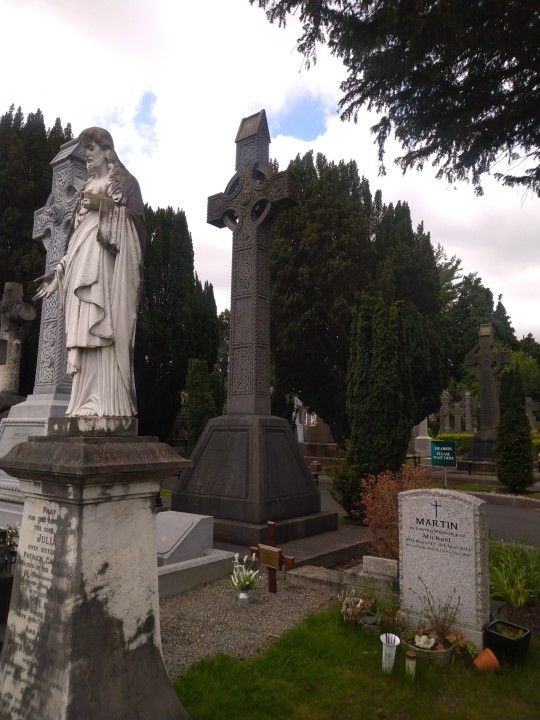



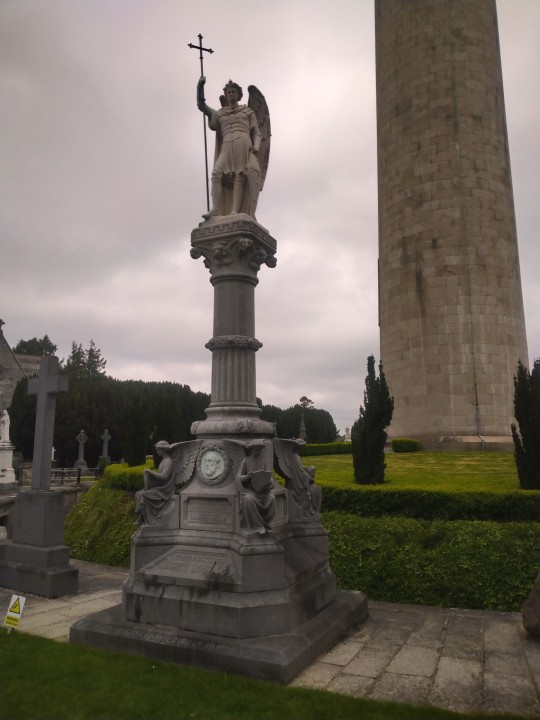
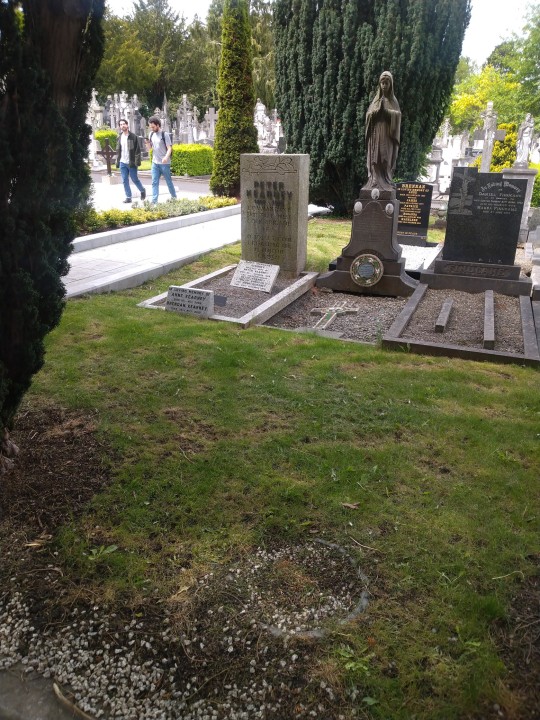
Went to Glasnevin Cemetery today for surprisingly the first time 😅
4 notes
·
View notes
Text

Glasnevin Museum and National Cemetery, Dublin, Ireland.
2 notes
·
View notes
Text

glasnevin cemetery
1K notes
·
View notes
Text
Swimming, Ice Cream, and... Getting Sick?
Hi everyone! I’m back after my third week in Ireland. This week has been quite the rollercoaster. Monday was the June Bank Holiday in Ireland so we didn’t have our usual physics lecture that day. Since we didn’t have class, we decided to go out to an Italian restaurant in Dublin Monday night. On Tuesday, we had a full day of classes during which we watched The Wind that Shakes the Barley and learned more about the Irish fight for independence. Wednesday afternoon consisted of a trip to The Forty Foot in Dún Laoghaire where we took a plunge in the ocean and stopped for some famous ice cream and drinks afterwards. The weather on Thursday was beautiful so we ended up playing basketball till it was dark after classes. Friday night I unexpectedly tested positive for COVID so that was basically the end of anything fun for the week.
Food
The Italian restaurant that we went to was called La Caverna and was located in Dublin’s famous Temple Bar. I ended up ordering the carbonara pasta after much deliberation between that and the tortelli. The inside of the restaurant was beautiful and the carbonara was delicious. It was so delicious that by the time I thought to take a picture, my plate was empty. Sorry about that. Anyways, I do have a picture of some ice cream that I bought from the Centra at UCD on Tuesday after class. I ordered one scoop of mint chocolate chip and one scoop of a bubble gum flavor. Both flavors were quite delectable.

Mint chocolate chip and bubble gum flavored ice cream from the Centra at UCD
Today, I ordered a large New Yorker pizza from Domino’s along with a side of twisted dough balls since I can't go anywhere. The entire pizza and all six dough balls were gone within a matter of minutes once I brought them up to my room. To be fair though, that was my only meal today and I was practically starving so it's not as insane as it sounds.
The Forty Foot
The Forty Foot is a popular swimming location in Dún Laoghaire that we visited earlier this week. The weather was decent that day, but it was definitely a little chilly because of the wind. Nobody that I’ve talked to actually knows how The Forty Foot got its name. It's basically just a 10 foot rock that people jump off of into the Atlantic. The water was frigid the first time I jumped in. I also got a mouthful of saltwater that I definitely wasn’t expecting because I don’t think I’ve ever swam in the ocean before. Despite the freezing cold water and the mouthful of saltwater, I did jump in a second time just for fun.
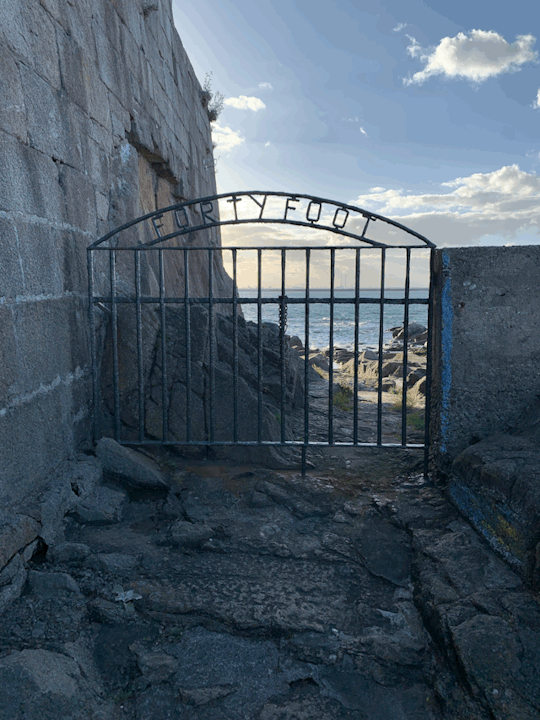

The Forty Foot in Dún Laoghaire (We jumped off of the rocks partially shown on the left side of the bottom picture)
After everyone swam for a bit, we walked down the road to Teddy’s Ice Cream which is home to the famous 99 whipped ice-cream cone. I got a traditional cone covered in crushed Oreos which was insanely delicious. I almost went back for seconds because it was so good but I managed to hold myself back. Compared to the Centra ice cream I mentioned earlier, Teddy’s Ice Cream was on another level of deliciousness. I don’t think too many other ice cream places that I’ve tried even come close to Teddy’s.
After devouring our ice cream, we walked to The Forty Foot pub which had an amazing view of the city. Our group sat on a balcony outside overlooking the ocean. It was a little chilly outside but the view was definitely worth it. We ordered a couple of pitchers for our group and sipped on them over the course of about an hour or two before we decided to head back to our dorms and sleep.
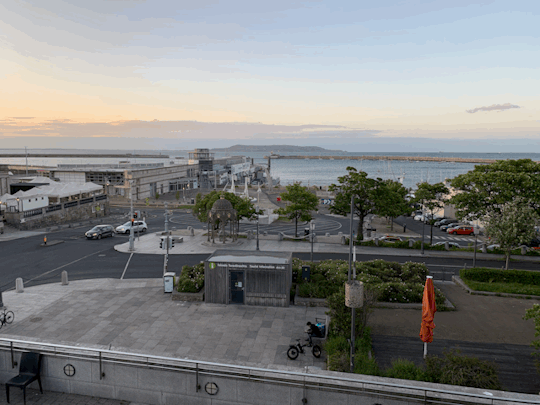
The view from the Forty Foot pub in Dún Laoghaire
COVID :(
Friday night, I found out that a few people in my group tested positive for COVID so I also took a test and unfortunately found out that I was also positive. This was somewhat surprising to me because I didn’t really feel sick. The only symptoms that I had were a very slight cough and a runny nose. Our program took a day trip to the Glasnevin Cemetery on Saturday, but I obviously had to sit out for that trip. Since Friday, I’ve basically just been isolating myself inside of my room, doing homework, and having food delivered. It is what it is though I guess.
Thank you all for reading my blog this week. Until next time!
Dominick Thornton
Computer Science
Big 10 STEM and Irish Studies at UCD
4 notes
·
View notes
